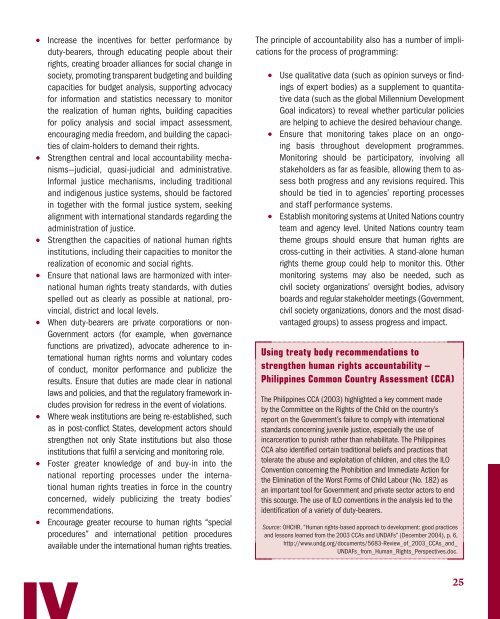Frequently Asked Questions on Human Rights-Based Approach
Frequently Asked Questions on Human Rights-Based Approach
Frequently Asked Questions on Human Rights-Based Approach
- No tags were found...
Create successful ePaper yourself
Turn your PDF publications into a flip-book with our unique Google optimized e-Paper software.
Increase the incentives for better performance byduty-bearers, through educating people about theirrights, creating broader alliances for social change insociety, promoting transparent budgeting and buildingcapacities for budget analysis, supporting advocacyfor informati<strong>on</strong> and statistics necessary to m<strong>on</strong>itorthe realizati<strong>on</strong> of human rights, building capacitiesfor policy analysis and social impact assessment,encouraging media freedom, and building the capacitiesof claim-holders to demand their rights.Strengthen central and local accountability mechanisms—judicial,quasi-judicial and administrative.Informal justice mechanisms, including traditi<strong>on</strong>aland indigenous justice systems, should be factoredin together with the formal justice system, seekingalignment with internati<strong>on</strong>al standards regarding theadministrati<strong>on</strong> of justice.Strengthen the capacities of nati<strong>on</strong>al human rightsinstituti<strong>on</strong>s, including their capacities to m<strong>on</strong>itor therealizati<strong>on</strong> of ec<strong>on</strong>omic and social rights.Ensure that nati<strong>on</strong>al laws are harm<strong>on</strong>ized with internati<strong>on</strong>alhuman rights treaty standards, with dutiesspelled out as clearly as possible at nati<strong>on</strong>al, provincial,district and local levels.When duty-bearers are private corporati<strong>on</strong>s or n<strong>on</strong>-Government actors (for example, when governancefuncti<strong>on</strong>s are privatized), advocate adherence to internati<strong>on</strong>alhuman rights norms and voluntary codesof c<strong>on</strong>duct, m<strong>on</strong>itor performance and publicize theresults. Ensure that duties are made clear in nati<strong>on</strong>allaws and policies, and that the regulatory framework includesprovisi<strong>on</strong> for redress in the event of violati<strong>on</strong>s.Where weak instituti<strong>on</strong>s are being re-established, suchas in post-c<strong>on</strong>flict States, development actors shouldstrengthen not <strong>on</strong>ly State instituti<strong>on</strong>s but also thoseinstituti<strong>on</strong>s that fulfil a servicing and m<strong>on</strong>itoring role.Foster greater knowledge of and buy-in into thenati<strong>on</strong>al reporting processes under the internati<strong>on</strong>alhuman rights treaties in force in the countryc<strong>on</strong>cerned, widely publicizing the treaty bodies’recommendati<strong>on</strong>s.Encourage greater recourse to human rights “specialprocedures” and internati<strong>on</strong>al petiti<strong>on</strong> proceduresavailable under the internati<strong>on</strong>al human rights treaties.The principle of accountability also has a number of implicati<strong>on</strong>sfor the process of programming:Use qualitative data (such as opini<strong>on</strong> surveys or findingsof expert bodies) as a supplement to quantitativedata (such as the global Millennium DevelopmentGoal indicators) to reveal whether particular policiesare helping to achieve the desired behaviour change.Ensure that m<strong>on</strong>itoring takes place <strong>on</strong> an <strong>on</strong>goingbasis throughout development programmes.M<strong>on</strong>itoring should be participatory, involving allstakeholders as far as feasible, allowing them to assessboth progress and any revisi<strong>on</strong>s required. Thisshould be tied in to agencies’ reporting processesand staff performance systems.Establish m<strong>on</strong>itoring systems at United Nati<strong>on</strong>s countryteam and agency level. United Nati<strong>on</strong>s country teamtheme groups should ensure that human rights arecross-cutting in their activities. A stand-al<strong>on</strong>e humanrights theme group could help to m<strong>on</strong>itor this. Otherm<strong>on</strong>itoring systems may also be needed, such ascivil society organizati<strong>on</strong>s’ oversight bodies, advisoryboards and regular stakeholder meetings (Government,civil society organizati<strong>on</strong>s, d<strong>on</strong>ors and the most disadvantagedgroups) to assess progress and impact.Using treaty body recommendati<strong>on</strong>s tostrengthen human rights accountability –Philippines Comm<strong>on</strong> Country Assessment (CCA)The Philippines CCA (2003) highlighted a key comment madeby the Committee <strong>on</strong> the <strong>Rights</strong> of the Child <strong>on</strong> the country’sreport <strong>on</strong> the Government’s failure to comply with internati<strong>on</strong>alstandards c<strong>on</strong>cerning juvenile justice, especially the use ofincarcerati<strong>on</strong> to punish rather than rehabilitate. The PhilippinesCCA also identified certain traditi<strong>on</strong>al beliefs and practices thattolerate the abuse and exploitati<strong>on</strong> of children, and cites the ILOC<strong>on</strong>venti<strong>on</strong> c<strong>on</strong>cerning the Prohibiti<strong>on</strong> and Immediate Acti<strong>on</strong> forthe Eliminati<strong>on</strong> of the Worst Forms of Child Labour (No. 182) asan important tool for Government and private sector actors to endthis scourge. The use of ILO c<strong>on</strong>venti<strong>on</strong>s in the analysis led to theidentificati<strong>on</strong> of a variety of duty-bearers.Source: OHCHR, “<strong>Human</strong> rights-based approach to development: good practicesand less<strong>on</strong>s learned from the 2003 CCAs and UNDAFs” (December 2004), p. 6,http://www.undg.org/documents/5683-Review_of_2003_CCAs_and_UNDAFs_from_<strong>Human</strong>_<strong>Rights</strong>_Perspectives.doc.25
















